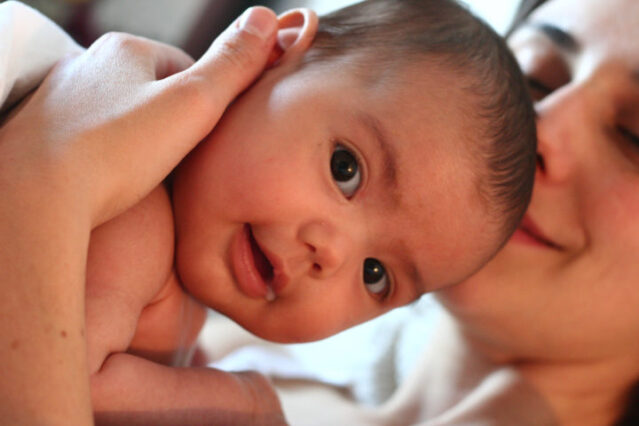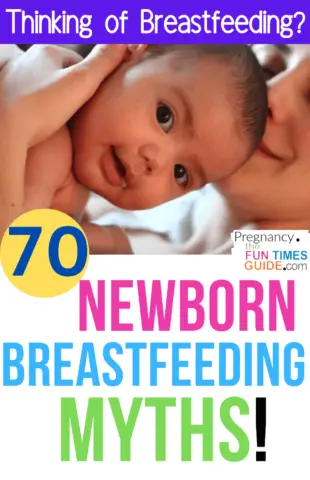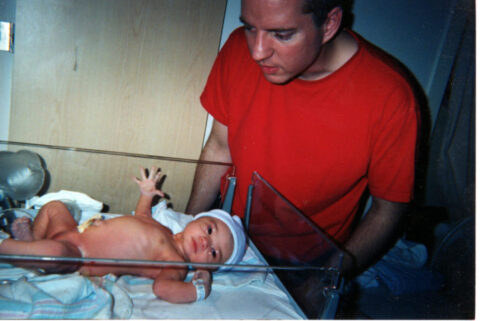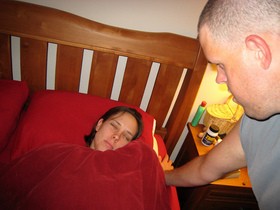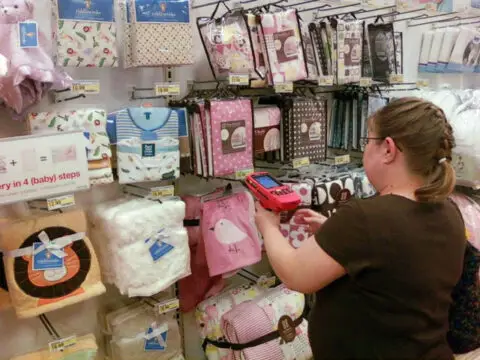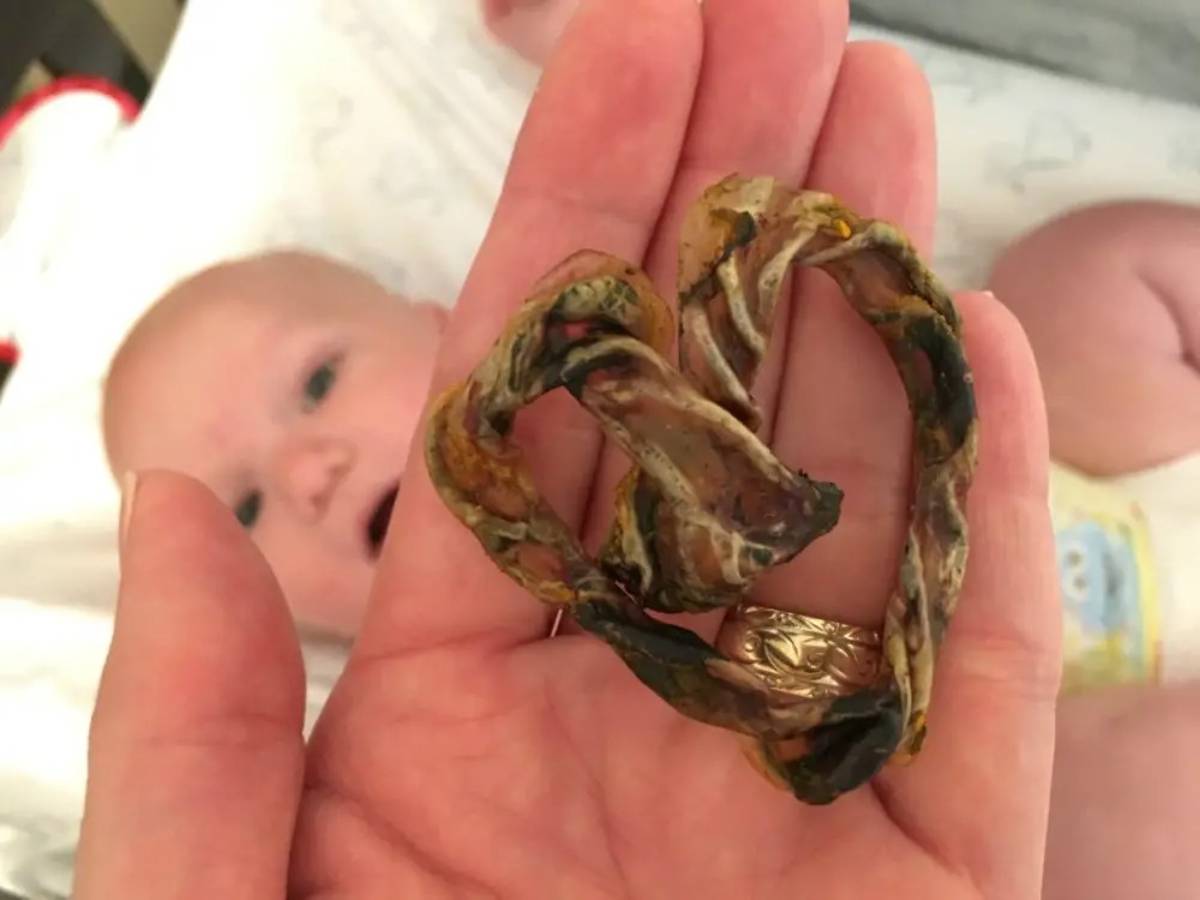If you’re a new mom, then you probably have lots of breastfeeding questions.
It’s really amazing to me how many myths there are about breastfeeding. Even more embarrassing, I actually thought some of these myths were true because I had learned them from my own mother or my grandmother.
As with any myth, information simply gets twisted a bit and eventually gets misinterpreted as it’s passed down from generation to generation, person to person.
That’s why it’s so important to educate yourself on what is true and what is a myth with regard to breastfeeding. As a new mom, I’m sure you have many breastfeeding questions — not the least of which is how to separate the myths from the facts.
Ready to hear some of those breastfeeding myths?…
Common Breastfeeding Myths
#1 – Your breasts will sag if you breastfeed. FALSE
There are a number of factors that can cause breasts to sag — such as heredity, for one. However, breastfeeding is not one of those factors.
#2 – It’s harder to breastfeed than to feed your baby from a bottle. FALSE
This is one that was perpetuated by the formula companies back when baby formula was first being introduced to moms. Of course, if you buy into this myth, these companies make money — so it stands to reason that they’re going to do everything they can to get you to believe it. Like many of the other breastfeeding myths, it’s false. While it can be a bit difficult to get your baby to latch on to your nipple at first, once she has it, breastfeeding is relatively easy for many new moms. Plus, you’ve got a ready supply of baby food no matter where you go!
#3 – You can’t drink any alcohol during the time that you are breastfeeding. FALSE
While you don’t want to go on a drinking binge, having a glass of wine or a beer after you’ve already breastfed your baby is fine. Alcohol takes about the same amount of time to leave the breast milk as it does to leave your bloodstream. Also, as long as you drink in moderation, there will not be enough alcohol in your breast milk to cause problems for your baby.
#4 – You shouldn’t breastfeed your baby past 6 months of age. FALSE
In most cultures around the world, it used to be common to breastfeed your baby until he was 2 to 4 years old. While some claim this makes the baby more dependent on the mother, there is no evidence that this is true. In fact, some say that extended breastfeeding actually makes the child more independent.
#5 – It’s normal to feel pain when breastfeeding. FALSE
If you are experiencing any kind of lasting, or lingering pain you should really talk to your doctor. While you might experience some discomfort when first beginning to breastfeed, this usually has to do with latching on issues. You should never feel any sort of extreme pain while breastfeeding.
#6 – Women with small breasts can’t produce enough milk. FALSE
The size of a woman’s breasts have nothing to do with how much milk she can produce. In reality, how much milk a woman produces is determined by how often the baby nurses and how much milk the baby takes in.
#7 – The first 3 or 4 days after the baby is born, there will not be enough milk for the baby. FALSE
This is not true. If the baby is not getting enough milk for the first few days it is usually because he is not latching onto the nipple correctly, not because the mom is not producing enough milk.
#8 – Breastfeeding will prevent you from getting pregnant. FALSE
This one is tricky. While you can become pregnant while breastfeeding, it is unlikely to happen until you begin having your periods again. Once you begin having a period (whether you are breastfeeding or not), you can indeed become pregnant. Prior to that, breastfeeding is about 98% effective as a birth control method. As good as that might sound, it is not reliable and you should consider talking to your doctor about a low-dose birth control pill or some other method to prevent conception. That is, if you don’t want to become pregnant again right away.
#9 – If you’re a blonde or a redhead, you’ll be more likely to experience nipple pain. FALSE
This one makes me laugh! But the reason I’m including it is a friend of mine who is a redhead had been told this by her grandmother. And she believed it! The truth is, if you experience nipple discomfort, your baby probably isn’t latching on correctly, or you may be holding your baby in an uncomfortable position.
#10 – Your breastmilk will not contain enough iron to nourish your baby. FALSE
This is another myth that’s been perpetuated by the formula companies, because they want you to pay lots of money to buy their baby formula. Breast milk is — bar none — the best source of iron for your newborn. Baby formulas sometimes contain more iron than is good for your baby — not to mention a lot of other things that aren’t so good such as aluminum, cadmium, and manganese.
#11 – If you have (or had) breast implants you can’t breastfeed. FALSE
There is no evidence that women who have had breast implants (now or in the past) can’t breastfeed. The only concern might be with the amount of milk a woman with breast implants produces. In some cases, you might not be able to produce enough milk for your baby due to the implants.
#12 – Nipple confusion doesn’t exist. FALSE
It happens when a new mom gives her baby a bottle first, before trying to breastfeed. Sometimes, in those cases, a baby will not breastfeed. That’s why it’s a good idea to breastfeed first. Then, it’s okay to introduce bottle feeding later for those times when you want to pump your breast milk and give it to your baby via a bottle.
#13 – You have to be really careful what you eat while breastfeeding. FALSE
There is no reason for a new mom to alter her diet. For example, there’s no evidence that eating spicy foods is going to make your breast milk taste spicy. While a bit of flavor of the spices may get into your breast milk, in most cases it won’t be enough to bother your baby. The only foods you want to completely avoid while breastfeeding are fish that are have a high mercury content.
#14 – Women with inverted nipples can’t breastfeed. FALSE
While a baby may have a harder time latching on to an inverted nipple, there is absolutely no evidence that women with inverted nipples can’t breastfeed.
Other Common Breastfeeding Myths
The breastfeeding myths don’t stop there!
In fact, there are many many myths associated with breastfeeding.
Here are more statements that are FALSE:
#15 – A woman who becomes pregnant must stop breastfeeding.
#16 – Eating spicy foods should be avoided while a woman is breastfeeding.
#17 – Your milk will “come in” immediately after you give birth.
#18 – Babies should be breastfed on a strict schedule.
#19 – A mother should wash her nipples each time before feeding the baby.
#20 – Giving the breast a nursing “rest” can help ensure more milk.
#21 – Many women do not produce enough milk.
#22 – If the baby has diarrhea or vomiting, the mother should stop breastfeeding.
#23 – Babies will stay on the breast for 2 hours because they like to suck.
#24 – Modern formulas are almost the same as breastmilk.
#25 – A breastfeeding mother has to drink lots of fluids, including more water.
#26 – If the mother has an infection she should stop breastfeeding.
#27 – Night nursing causes dental problems.
#28 – A crying baby means he’s not getting enough milk when nursing.
#29 – Babies need formula until their mother’s milk comes in.
#30 – Jaundiced babies should not continue breastfeeding.
#31 – Serious athletes can’t breastfeed.
#32 – Breastfeeding will ruin your sex life.
#33 – A mother who bleeds from her nipples should not breastfeed.
#34 – If a mother has surgery, she has to wait a day before restarting nursing.
#35 – Breastfeeding twins is too difficult to manage.
#36 – Never wake a sleeping baby to breastfeed.
#37 – Breastfeeding women cannot take the birth control pill.
#38 – A baby should be on the breast 20 minutes on each side.
#39 – Early feedings should be timed to prevent maternal sore nipples.
#40 – The amount of milk you can pump is indicative of your milk supply.
#41 – Breastfeeding ruins the shape of your breasts.
#42 – A breastfeeding mother has to eat more in order to make enough milk.
#43 – Babies with cleft lip and/or palate cannot breastfeed.
#44 – Premature babies need to learn to take bottles before they can start breastfeeding.
#45 – If you’re angry or upset, you’ll sour your milk.
#46 – Breastfeeding influences a baby’s future sexual orientation.
#47 – A breastfeeding mother should avoid high allergenic foods (dairy, nuts, gluten) while breastfeeding.
#48 – Adoptive mothers can’t breastfeed.
#49 – Women whose breasts do not enlarge or enlarge only a little during pregnancy, will not produce enough milk.
#50 – If the mother is taking medicine she should not breastfeed.
#51 – Breastfeeding babies need other types of milk after 6 months.
#52 – A mother whose breasts do not seem full has little milk in the breast.
#53 – Breastfeeding deprives your mate and other friends and family of their chance to bond with the baby.
#54 – You can’t breastfeed if your plan to go back to work or school.
#55 – Breastfeeding clothes and pumps end up costing as much as formula.
#56 – Pumping is a good way of knowing how much milk the mother has.
#57 – After menopause you can’t breastfeed.
#58 – Breastfeeding makes you fat.
#59 – Formula fed babies sleep better.
#60 – You can’t breastfeed after a cesarean section birth.
#61 – Breastfeeding takes more time than bottle-feeding.
#62 – A breastfeeding baby needs extra water in hot weather.
#63 – If the baby is off the breast for a few days (weeks), the mother should not restart breastfeeding because the milk sours.
#64 – Breastfeeding changes the shape and size of your breast, or reduces sensitivity.
#65 – After exercise, a mother should not breastfeed.
#66 – A woman who has had breast reduction surgery cannot breastfeed.
#67 – There is no way to know how much breast milk the baby is getting.
#68 – When your milk dries up, it’s gone forever.
#69 – You have to prep your breasts to get them ready for breastfeeding.
#70 – A breastfed baby should never have bottles.
Having Trouble Getting Baby To Breastfeed?
Many new mothers have difficulty when it comes to breastfeeding their baby for the first time.
Here’s how to tell that your baby is eating enough:
- You can clearly hear the baby swallowing.
- Baby comes off the nipple on his own and is relaxed.
- Baby is being fed 8 to 12 times in 24 hours.
- Baby has 6 to 8 soaked through diapers a day, and 3 to 4 of them have mustard colored, curdy stools.
Finally, you should feed your baby from one breast, burp him, and then offer the other breast. He may not want any more or he may latch on and only feed for a short time longer. By offering the 2nd breast, you can be sure that he is getting enough to eat.
Need More Help Getting Started Breastfeeding?
Stacey Stewart is a Certified Lactation Educator, mother of 3, and the founder of Milkology. She has taught lactation to thousands of women and she can help you, too!
Stacey has a wonderful online tool called The Ultimate Breastfeeding Course — where she helps you breastfeed like a pro in 90 minutes!
She teaches you the techniques for latching, positioning, expressing, and storing breast milk. She also gives you a better idea of what to expect in terms of diapers and output — especially during those first 2 months!
Basically, she becomes your support network and is there to help you succeed every step of the way.
The support and guidance you receive from Stacey will make your breastfeeding experience as a new mom trouble-free.
RELATED: 5 Tips To Help You Overcome Breastfeeding Problems
Like this post? Save it to read again later… or share with others on Pinterest!
My favorite things to write about are topics that have to do with pregnancy, weddings, saving money, living green, and life with dogs. When I’m not writing, I love to spend time with my husband, read, create 3D artwork and Native American beadwork.
